

Grammar


Tenses


Present

Present Simple

Present Continuous

Present Perfect

Present Perfect Continuous


Past

Past Simple

Past Continuous

Past Perfect

Past Perfect Continuous


Future

Future Simple

Future Continuous

Future Perfect

Future Perfect Continuous


Parts Of Speech


Nouns

Countable and uncountable nouns

Verbal nouns

Singular and Plural nouns

Proper nouns

Nouns gender

Nouns definition

Concrete nouns

Abstract nouns

Common nouns

Collective nouns

Definition Of Nouns

Animate and Inanimate nouns

Nouns


Verbs

Stative and dynamic verbs

Finite and nonfinite verbs

To be verbs

Transitive and intransitive verbs

Auxiliary verbs

Modal verbs

Regular and irregular verbs

Action verbs

Verbs


Adverbs

Relative adverbs

Interrogative adverbs

Adverbs of time

Adverbs of place

Adverbs of reason

Adverbs of quantity

Adverbs of manner

Adverbs of frequency

Adverbs of affirmation

Adverbs


Adjectives

Quantitative adjective

Proper adjective

Possessive adjective

Numeral adjective

Interrogative adjective

Distributive adjective

Descriptive adjective

Demonstrative adjective


Pronouns

Subject pronoun

Relative pronoun

Reflexive pronoun

Reciprocal pronoun

Possessive pronoun

Personal pronoun

Interrogative pronoun

Indefinite pronoun

Emphatic pronoun

Distributive pronoun

Demonstrative pronoun

Pronouns


Pre Position


Preposition by function

Time preposition

Reason preposition

Possession preposition

Place preposition

Phrases preposition

Origin preposition

Measure preposition

Direction preposition

Contrast preposition

Agent preposition


Preposition by construction

Simple preposition

Phrase preposition

Double preposition

Compound preposition

prepositions


Conjunctions

Subordinating conjunction

Correlative conjunction

Coordinating conjunction

Conjunctive adverbs

conjunctions


Interjections

Express calling interjection

Phrases

Sentences

Clauses

Part of Speech


Grammar Rules

Passive and Active

Preference

Requests and offers

wishes

Be used to

Some and any

Could have done

Describing people

Giving advices

Possession

Comparative and superlative

Giving Reason

Making Suggestions

Apologizing

Forming questions

Since and for

Directions

Obligation

Adverbials

invitation

Articles

Imaginary condition

Zero conditional

First conditional

Second conditional

Third conditional

Reported speech

Demonstratives

Determiners

Direct and Indirect speech


Linguistics

Phonetics

Phonology

Linguistics fields

Syntax

Morphology

Semantics

pragmatics

History

Writing

Grammar

Phonetics and Phonology

Semiotics


Reading Comprehension

Elementary

Intermediate

Advanced


Teaching Methods

Teaching Strategies

Assessment
Evaluative adverbs and adjectives
المؤلف:
OLIVIER BONAMI AND DANIELE GODARD
المصدر:
Adjectives and Adverbs: Syntax, Semantics, and Discourse
الجزء والصفحة:
P-279-C9
2025-04-28
1286
Evaluative adverbs and adjectives
Another way of approaching the semantics of evaluative adverbs is by comparing them with the base adjective, e.g. malheureusement with malheureux. Since we assume that evaluative adverbs take a propositional argument, we will compare their use with uses of adjectives where the adjective uncontroversially takes a propositional argument; that is, in French, when the adjective takes a finite clause as its complement.3 Strikingly, when we look at a root sentence, there is a systematic paraphrase between the sentences with an evaluative adverb and with the corresponding adjective. Moreover, an entailment similar to that noted in (1a) for the adverb is valid with the adjective.
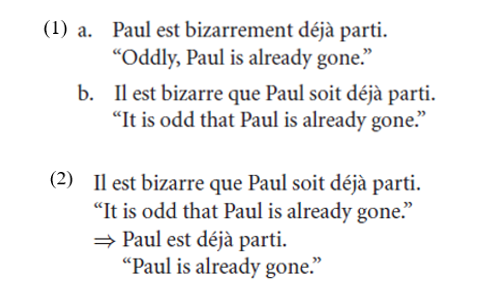
It is therefore appropriate to ask whether there is an equivalence (modulo the syntax) between the adverb and the adjective. The answer is clearly negative: first, while the content of the adjective is, as is the usual case, part of the main content of the sentence, this is not so for adverbs; second, while the entailment in (2) is an effect of presupposition, this is not so for the implication in (1a).
Consider the truth conditions of the conditionals in (3). Crucially, they ignore the adverb; that is, the presence of the adverb does not affect what conditional is expressed, and only provides an evaluative comment on the strangeness of one of the related propositions. This is not true with the adjective, which takes part in the semantics of the clause it occurs in, and thus modifies what conditional gets expressed (4).4
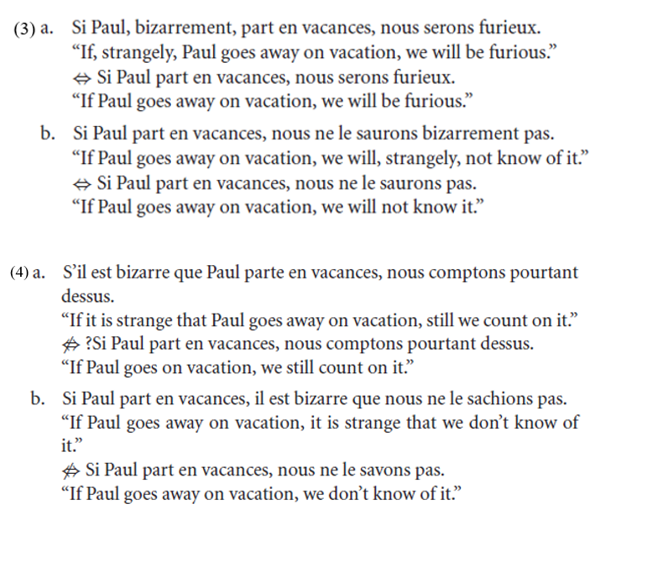
The facts in (3) show that the content of the adverb is not part of the main content: in this instance, it is not asserted as are the other expressions.
The evaluative adverb also differs from the adjective with respect to the status of the proposition argument: the adjective presupposes it while the adverb does not. Let us first test presupposition holes (Karttunen 1974); for instance, the presuppositions included in the antecedent of a conditional are carried over to the whole sentence, as illustrated in (5) with the factive verb regretter. The evaluative adjective (6), but not the evaluative adverb (7), patterns with presupposition triggers.
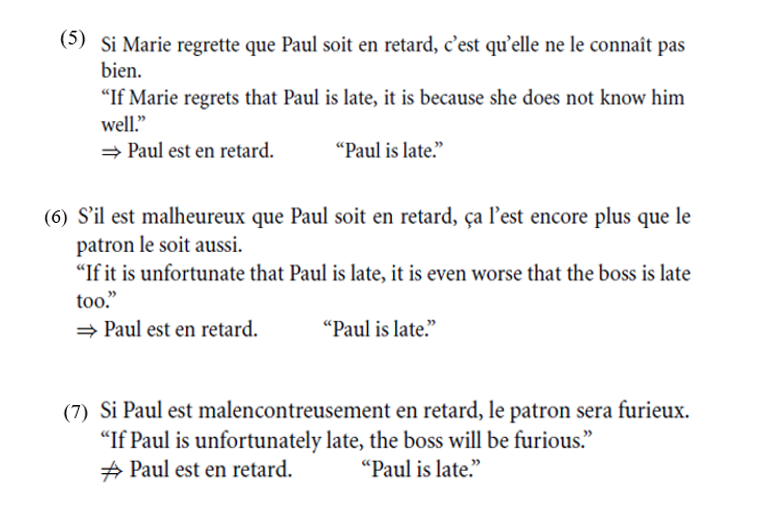
Modal operators, another class of presupposition holes, confirm this observation.
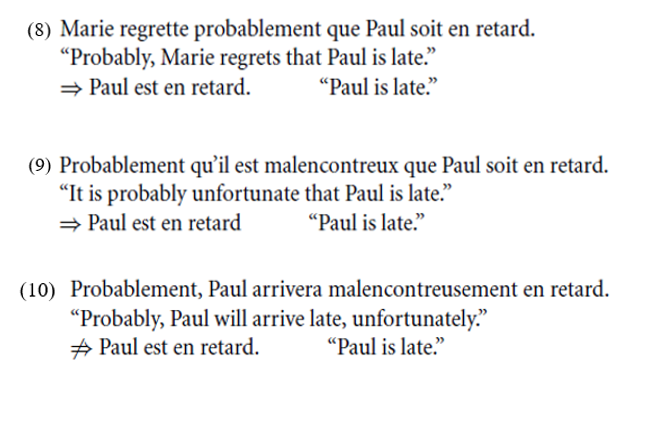
On the other hand, presupposition filters, such as the consequent of a conditional, may prevent transmission of the presupposition to a larger context. Here, we observe a different contrast between the adjective and the adverb. While the adjective in (12) behaves as expected (the presupposition is trapped), the evaluative adverb does not seem to be felicitous in such contexts (13).
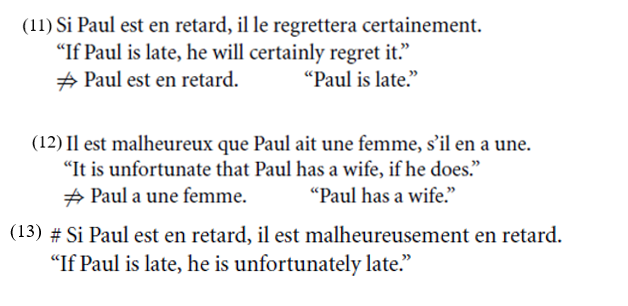
If, as suggested above, the adverb does not participate in the main content of the sentence, and has no influence on the truth conditions, one may wonder why (13) is not appropriate while a plain tautology such as (14a) is. It is well known that tautologies are acceptable insofar as they can be pragmatically reinterpreted in order to play a role in dialogue (e.g., Levinson 1983: 110–111). For instance, (14a) may be uttered in order to convey something like “let us not lament that Paul is late, let us discuss what we can do about the situation.” But note that this type of reinterpretation depends on the formal parallelism between the antecedent and the consequent; it is not sufficient that the two clauses be semantically equivalent, as shown by the absence of reinterpretation in (14b–c). Thus it comes as no surprise that the presence of the adverb makes reinterpretation impossible.5 In fact, (14b–c) may be used to buttress semantic equivalences between expressions, which is not the case, of course, in (14a). It is not the case either in (13) because there is no way of finding an epistemic difference between the antecedent and the consequent, given that the adverb makes no contribution to the main content.

We conclude that, although the adverb is associated with the same semantic relation as the adjective, it cannot be considered to be a simple equivalent with a different syntactic category.
We account for the semantic behavior of evaluative adverbs with the lexical decomposition schema in (15), where p is a variable over propositions, “∀∗” denotes a universal closure operation (binding all free variables in its scope), and adjective is the content of the evaluative adjective corresponding to the adverb. Taking malheureusement as our typical evaluative adverb, in the absence of free variables, (15) says that this adverb takes a proposition argument and, if this proposition is true, then it is unfortunate that it is.

The basic lexical relation on which the semantics of the adverb relies is identical to that of the adjective. This does justice to the systematic relation between the adverb and the adjective. However, crucially, schema (15) mentions two differences, the universal closure, and the conditional semantics.
Why the conditional semantics? First, let us note immediately that it solves the problem of the different status of the argument with respect to presupposition, assuming an appropriate partial logic for presupposition. For instance, under Peters’ (1979) interpretation of the logical connectives, it is a theorem that if q presupposes p, then p →q does not presuppose p;7 thus (15) accounts directly for the contrast between (12) and (13): although it is unfortunate that p presupposes p, unfortunately p does not because it means the same as if p, then it is unfortunate that p.
Second, the conditional form allows us to get the right truth conditions in the different contexts in which the adverb occurs. Consider an assertion of a simple declarative sentence containing an evaluative. Thus here the speaker is committed to the truth of both Paul is already gone and If Paul is already gone, then it is odd that he is. Assuming that speakers are committed to the truth of obvious entailments of their commitments, this means, by modus ponens, that the speaker is committed to the truth. This accounts for the paraphrase relation between evaluative adverbs and adjectives in simple declarative sentences. Next consider evaluative adverbs occurring in conditionals. In such cases, since the argument of the evaluative is not asserted, the conditional semantics in (15) takes its full force. Thus, the evaluative comment is that if indeed Paul goes away on vacation, it is strange that he does, which conforms to our semantic intuitions.
Finally, consider cases where the evaluative occurs inside a question. Although many authors claim that these are ungrammatical, Bonami et al. (2004) show that this is true only of initial occurrences (16a). If the evaluative is not clause-initial, then it is felicitous (16b).

In (16b), the evaluative is not part of the query: the sentence does not ask for which x it is odd that x arrived on time. Rather, it simply asks who arrived on time, and the evaluative provides a comment to the effect that whoever arrived on time, it is odd that they did. This is as expected, given (15) and a syntax and semantics for questions in the spirit of Ginzburg and Sag (2001). Simplifying somewhat, we assume that a wh-question such as (17a) denotes the proposition abstract in (17b). The abstraction operation is associated with the wh-construction, and thus it has not applied yet when the adverb is combined with the clause’s content. Thus we assume that in (17b), the argument of the adverb is the open proposition in (18a); thus the evaluative comment is (18b), which conforms with our initial intuition.8
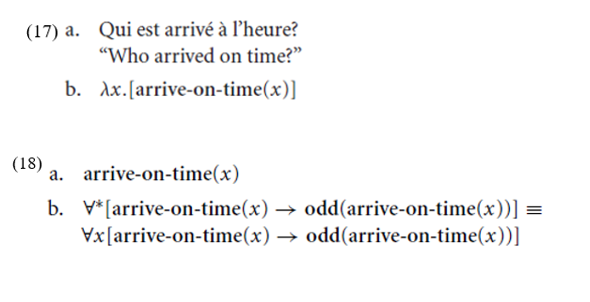
1 Note that many of the relevant adjectives may take other types of arguments, and even give rise to non-evaluative adverbs. For instance the adjective malencontreux ‘unfortunate’ may qualify both propositions and events, and indeed there exist both evaluative and “manner” uses of malencontreusement. In the remainder of this chapter we leave aside the problem of adjective and adverb polymorphism, to concentrate on evaluative predications.
2 The difference between evaluative adverbs and adjectives is such that it is difficult to find natural sounding conditionals where both the adjective and the adverb are appropriate; hence we do not try to give parallel examples. Note that (i) this does not affect our observation on the semantic transparency of adverbs, and on the contrary (ii) it reinforces the observation that the adverb and the adjective do not have the exact same semantics.
3 Of course, if the adverb occurs both in the antecedent and the consequent, as in (i), formal parallelism is met and the expected pragmatic reinterpretation is available.
(i) Si Paul est malheureusement en retard, Paul est malheureusement en retard.
“If Paul is unfortunately late, Paul is unfortunately late.”
4 Note that we do not assume a definite semantic contribution for the suffix -ment, for two reasons.
First, the semantic contribution suggested by (23), i.e. ÎQÎp.∀∗[p → Q(p)], is adequate only for evaluatives, and not, e.g., for modals: modal adverbs do not introduce a conditional or bind free variables. Second, the formation of evaluative adverbs is not productive, and there are only about fifteen items in the lexicon with the relevant properties (Molinier and Levrier 2000 list ten items, to which should be added at least malencontreusement ‘unfortunately, miraculeusement ‘miraculously,’ incroyablement ‘incredibly’), so that there is no interesting morphological generalization to be made.
5 See Krahmer (1998: chapter 4) for discussion.
6 One concern with the analysis as stated in (15) is that it does not put enough material in the restrictor to give the right semantics. Thus if the question is (i), we want the universal to quantify over students only, as in (ii), whereas (15) gives (iii). The proposed syntax–semantics interface solves this issue.
(i) Quels etudiants sont bizarrement arrives a l’heure?
“Which students oddly arrived on time?”
(ii) ∀x[[student(x) ∧ arrive-on-time(x)] → odd(arrive-on-time(x))]
(iii) ∀x[arrive-on-time(x) → odd(arrive-on-time(x))]
 الاكثر قراءة في Linguistics fields
الاكثر قراءة في Linguistics fields
 اخر الاخبار
اخر الاخبار
اخبار العتبة العباسية المقدسة

الآخبار الصحية















 قسم الشؤون الفكرية يصدر كتاباً يوثق تاريخ السدانة في العتبة العباسية المقدسة
قسم الشؤون الفكرية يصدر كتاباً يوثق تاريخ السدانة في العتبة العباسية المقدسة "المهمة".. إصدار قصصي يوثّق القصص الفائزة في مسابقة فتوى الدفاع المقدسة للقصة القصيرة
"المهمة".. إصدار قصصي يوثّق القصص الفائزة في مسابقة فتوى الدفاع المقدسة للقصة القصيرة (نوافذ).. إصدار أدبي يوثق القصص الفائزة في مسابقة الإمام العسكري (عليه السلام)
(نوافذ).. إصدار أدبي يوثق القصص الفائزة في مسابقة الإمام العسكري (عليه السلام)


















